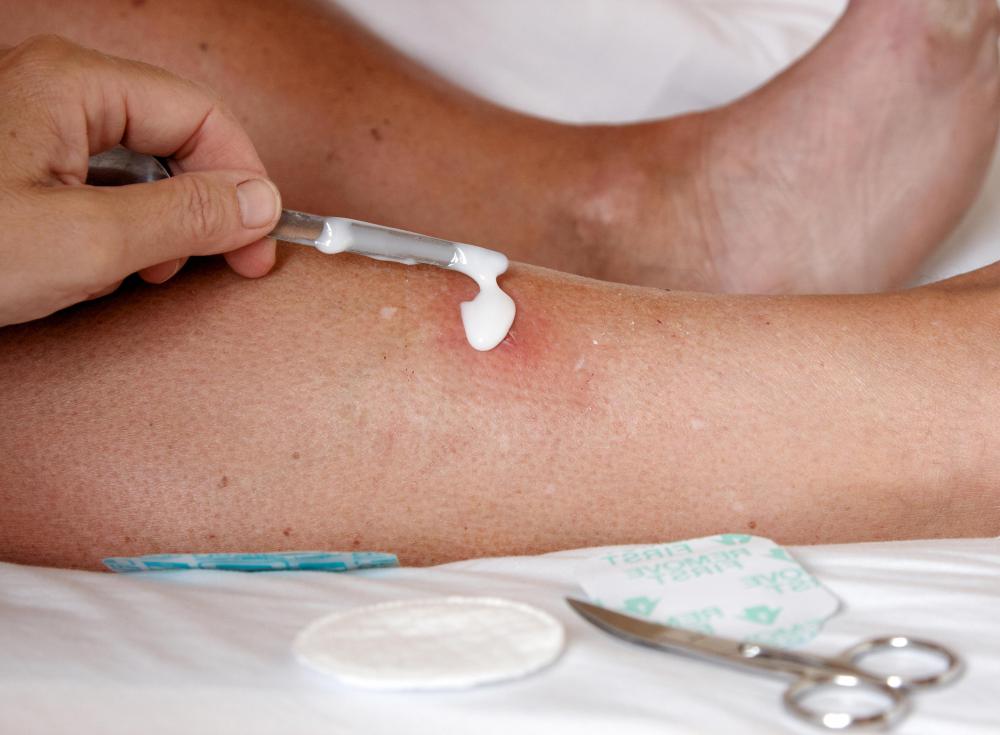At WiseGEEK, we're committed to delivering accurate, trustworthy information. Our expert-authored content is rigorously fact-checked and sourced from credible authorities. Discover how we uphold the highest standards in providing you with reliable knowledge.
How do I Choose the Best Topical Ointment?
Acquiring topical ointment is probably as simple as a quick trip to a pharmacy, grocery store, or some other local retailer. Choosing the best one may not be so simple since you are likely to find a wide variety on the shelves. There are some tips that can help you, however. To begin with, you need to carefully read the packages. This will give you a great deal of information that will help you to make the best choice.
When you go into a store, the first thing you need to consider is your ailment. There are many types of ointment. Some are multi-purpose creams, but others are specially formulated to handle certain problems. It is usually best to begin narrowing your choices by focusing on the creams that aim to address your problem.

There are several reasons for this. One reason is because it is unnecessary to apply ingredients to your skin you don’t need. Another good reason is because when you get multipurpose skin ointments, even if your ailment is included among those that are addressed, they are not likely to have as much of the ingredients that you need. You are, therefore, not as likely to experience maximum effects.

Once you have limited your choices to a specific type of topical ointment, you should read the ingredients. Eliminate any options that contain ingredients you know you are allergic to or you think may cause irritation. Even if there are only small amounts of such an ingredient, try to find another option. If you know your skin is sensitive but you are not sure what affects you, try to find a hypoallergenic or all natural ointment.
The next part of the package you want to focus on is the part that outlines the side effects. Many people falsely believe it is unnecessary to consider this when dealing with something as simple as topical ointment. They are very wrong.
Some of the side effects listed on topical ointments can be discouraging. For example, some may say there is a risk of skin cancer. There is no need to risk a major problem to solve a minor one.
Within the options that remain, you should consider brand and price. Many people believe they are purchasing the best when they purchase a brand name. These often cost more than store brands. However, if the ingredients are the same, in many cases the ointments are the same or similar, meaning it is not necessary to pay for the more expensive topical ointment.
AS FEATURED ON:
AS FEATURED ON:












Discussion Comments
If you are trying to treat an itch, hydrocortisone cream works great. I use it on everything from rashes to bug bites, and it lessens the itch considerably.
I have even used it on pimples before. It takes the redness out of the bumps. I had a bad habit of squeezing pimples, which would make the skin swell and turn bright red, but hydrocortisone would shrink the swelling and take away the redness.
@wavy58 – If you use lidocaine only on small spots, it isn't dangerous. I have used benzocaine topical ointment before to numb painful areas of my skin, and nothing bad happened to me.
My husband accidentally flicked some hot bacon grease onto my legs as I was standing by, and I developed blisters from the burn. My skin really hurt, and benzocaine numbed it totally.
It wears off after awhile, and you apply more. The good thing is that you usually only have to use it for a couple of days, so you lessen the risk of severe side effects.
I have a lot of mosquitoes and wasps in my yard, and I get stung rather frequently. Wasp stings are painful, and mosquito bites are very itchy.
I went to the pharmacy last week to see if I could find something to treat both. I considered buying topical lidocaine, because it can totally numb the area.
However, after reading the side effects, I put the tube back on the shelf. The label said that you could actually die if you put too much of the stuff on! Your skin could absorb it all, and it could kill you.
I just didn't want to risk this. I bought an antihistamine cream instead, and it has worked well.
I like to keep a tube of topical antibiotic ointment around the house, because I like to be prepared to treat scratches and scrapes. I never buy the more expensive brands, though.
Seriously, the ingredients in the expensive brand and in the generic brand are exactly the same. Why would anyone pay more for something identical to the cheap option?
I've been using this antibiotic ointment for years, and it always seems to help my cuts heal faster. I put it on and then stick a bandage on top, and I know that I'm on my way to recovery.
Post your comments